This post will be even shorter than my usual time-boxed effort.
Let’s begin.
Every week, or month, or quarter, a new body of trust research gets a decent amount of attention in corporate circles. It’s almost always the same thing:
Certain industries are slightly less (or more) trusted than others
There’s a big gap in perceptions from the inside (say, corporate leaders) to the outside (everyday folks i.e. ‘consumers’)
Trust, even though no one can define it, is thought to have significant business value (I believe it does, but come at this from a different perspective)
Privacy and agency (or self-determination) in a more general sense is SUPER important to said ‘consumers’ (I’ve written about the misconceptions of the privacy paradox in the past. This is largely the result of system dynamics. We shan’t cover the nuance of this today)
The whole thing is framed in typical risk / corporate governance speak (this can be highly problematic for various reasons, mostly because the language, constructs, processes etc. massively constrain meaningful action and disable the type of paradigm shift needed in business today)
There’s of course a significant business opportunity due to trust gaps, which said services firm is well positioned to help the leaders/s solve (oxymoronic, given the work I do could be misconstrued as having the same basic message)

Now, I’m yet to see particularly compelling evidence that this type of research meaningfully contributes (I’ll stay away from the ‘c word’… that’s right, ‘you guessed it, causal’) to organisational action.
So, why do I make the claim that leaders need to stop relying (I’ll clarify why I frame it this way shortly) on said research? Here’s the TLDR:
Trust is a biopsychosocial phenomena (any attempt to describe it is just a model. And yes, “all models are wrong, some are useful.” Oh, and “the map is not the territory” and all that) that cannot be ‘controlled’ by an organisation.
Trust is something someone else believes, resulting not just from some type of deliberative cognitive process, but myriad factors that likely include culture, epigenetics and a bunch of other stuff
This research tends to rely on attitudinal assertions, which are fraught with issues (i.e. when I’m asked do I trust x party, in context y, and to what extent, do I mean the same thing as any other research participant?) that mean we should decrease the confidence we assign to ‘findings’ (are we actually getting at ‘trust’ here? We don’t know…)
A lot of this focuses on outcomes or trust states, or just generally stuff that’s ‘out there’ in the world. We only have direct influence over what happens ‘in here’. And that’s shaky at the best of times
Because of this and so much more, leaders should not rely on this type of research. It should form part, likely a small part, of the inputs that inform what it means to build and steward a benevolent, competent and high integrity organisation.
As always - broken record alert y’all - it’s about being trustworthy. Leaders need to start from the inside. They need to explore what they, together with the people that make the organisation they help lead what it is, believe will best contribute to benevolence, integrity and competence. They need to build these organisational features as a matter of strategic priority. They need to give those that interact with the organisation in various ways good evidence of the organisation’s trustworthiness.
From this basis they can operationalise certain initiatives, and attempt to monitor, measure and improve on the impacts they seem to have.
This approach - working from the inside out - is far more likely to contribute to ‘higher’ trust relationships with various stakeholders. It won’t work every time. There will be variance. But the likelihood is in your favour if you take this approach.
So, to wrap up, take all this type of research with a dose of salt. Don’t directly relying on it. Use it as an input into a process that informs the strategic actions you take to design and operationalise features of organisational trustworthiness.
With love as always.



